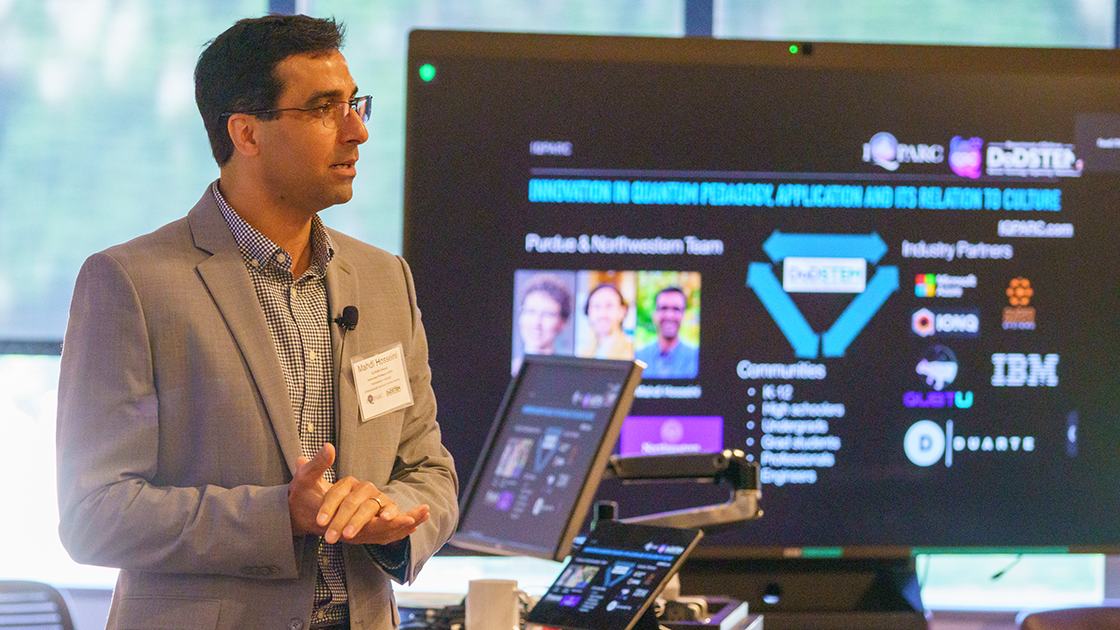Emerging Technologies through Engineering the Sub-Atomic Quantum World
Professor Mahdi Hosseini hosted the Quantum Summer School workshop for STEM students
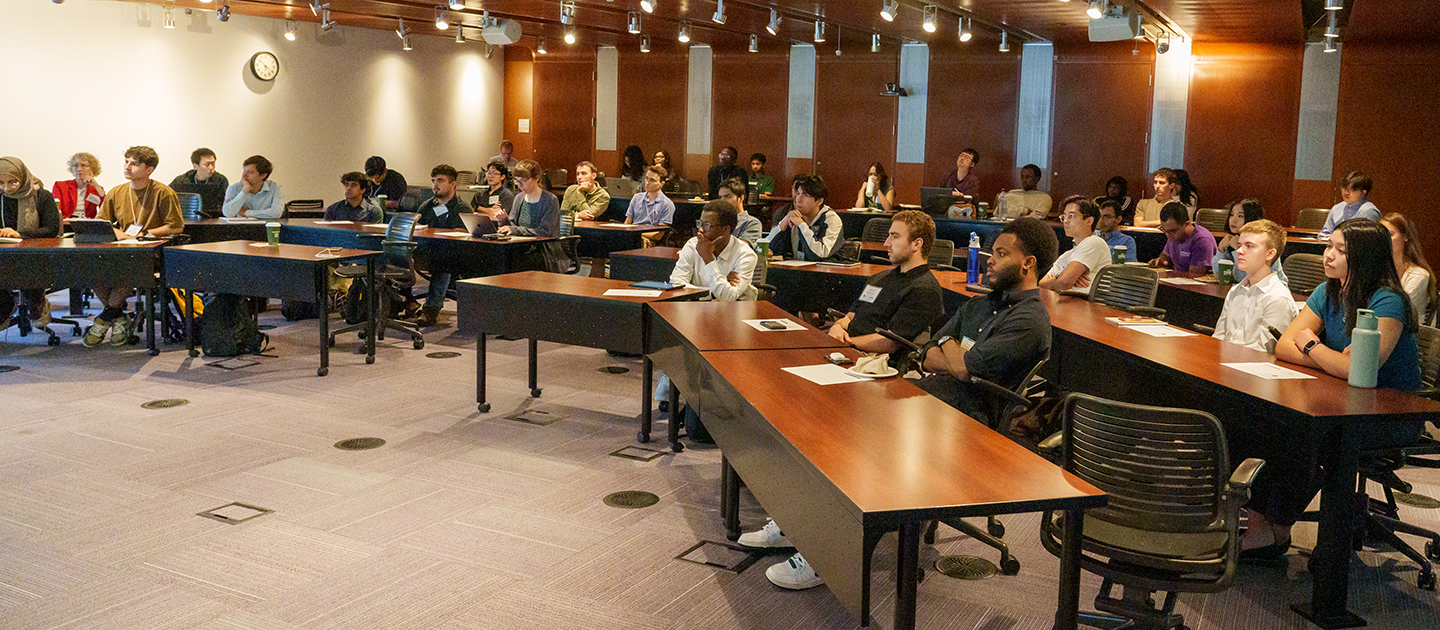
One hundred years ago, physicists including Max Born, Niels Bohr, Werner Heisenberg, and Erwin Schrödinger theorized the foundations of quantum mechanics, unlocking atomic and subatomic secrets, challenging the deterministic picture of the universe painted by the Newtonian laws.
Marking the centenary of the quantum revolution, the United Nations proclaimed 2025 as the International Year of Quantum Science and Technology. The worldwide initiative aims to increase public awareness and to inspire the next generation of scientists and engineers who will leverage the unique behaviors of quantum particles to build more efficient, powerful, and sustainable technologies.
Northwestern Engineering’s Mahdi Hosseini shares these public education and quantum workforce pipeline goals. An associate professor of electrical and computer engineering at the McCormick School of Engineering, Hosseini leads the Innovation in Quantum Pedagogy, Application, and its Relation to Culture (IQ-PARC) project, founded in 2021 through funding by the US Department of Defense National Defense Education Program. In collaboration with Purdue University, the program engages hundreds of undergraduates, thousands of middle school students, and tens of thousands of online learners.
On August 14-15, Northwestern hosted the IQ-PARC Quantum Summer School aimed at sharing knowledge of quantum concepts and technologies with STEM students, including those with underrepresented backgrounds, through interactive lectures and hands-on activities. The workforce development event was designed to facilitate connections among students from across the country who are determining the next stages of their academic or professional career — be it attending graduate school or joining industry.

Attendees included 25 graduate students and 34 undergraduate students studying computer engineering, computer science, mathematics, physics, and materials science — of these, 20 students applied for and received up to $1,000 stipend to reimburse travel and lodging expenses. In addition to 38 Northwestern students, participants joined from institutions including Alabama Agriculture and Mechanical University, California Institute of Technology, Florida International University, Illinois Institute of Technology, North Carolina State University, Purdue University, Rice University, Southern Illinois University Edwardsville, Syracuse University, University of Connecticut, University of Minnesota, University of Oklahoma, University of Illinois Chicago, University of Illinois Urbana-Champaign, and University of Wisconsin–Milwaukee.
“I decided to join this workshop because I am interested in a lot of different things,” said Bryan Villalpando-Hernandez, a rising third-year student in materials science at Northwestern Engineering. “I'm interested in going into a PhD program, but there are so many different fields it's hard to pick just one. This could really help me narrow down what I want to do.”
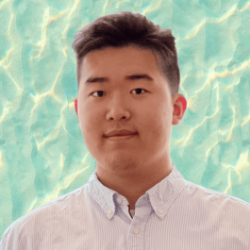
Quantum Fundamentals
Erica Carlson, 150th Anniversary Professor of Physics and Astronomy at Purdue University and cofounder of IQ-PARC, invited the Quantum Summer School participants to imagine themselves shrinking down to the level of Marvel’s Ant-Man to start thinking quantum.
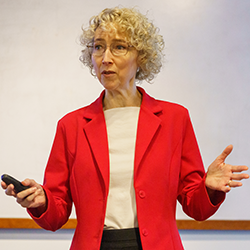
Using a stretched Slinky, Carlson helped students visualize how a wave encodes information about the state of an atomic or subatomic particle — its energy, velocity, speed, momentum, and position. She also discussed the fundamentals of quantum waves, including wave-particle duality (an object can act like a wave or a particle depending on the experimental circumstances) and interference effects (how quantum waves interact to either diminish or amplify each other.)
While spinning a coin on the table, Carlson described how quantum particles exist in multiple states simultaneously until measured — termed superposition. The spinning coin is neither heads nor tails, but if you disturb the system by collapsing the coin under your palm, you’ve forced a measurement. Quantum measurements reveal the probabilistic nature of quantum mechanics — a 50/50 degree of randomness in the case of our coin.
“Observers disturb what they measure,” Carlson said. “I get back answers that are quantized, but they're quantized according to my choice of quantum measurement. As far as we can tell, it's a very sudden, uncontrollable change. This is called wave function collapse. The prior state before your measurement only sets the probabilities.”
Quantum communication and sensing
While recent movies like Everything Everywhere All at Once and Doctor Strange in the Multiverse of Madness captivated audiences with fantastical representations of quantum phenomena, Northwestern Engineering’s Prem Kumar recalled his excitement watching Scotty “beam up” the crew of the Starship Enterprise.
Could the science fiction of the Star Trek transporter become a reality? Not exactly.
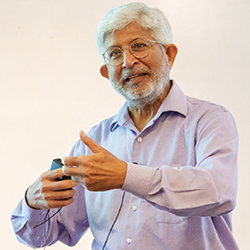
Quantum teleportation leverages the quantum phenomenon of entanglement, or the interaction of particles such that their physical properties — like momentum, position, or polarization — are interdependent, regardless of distance.
Kumar and Hosseini are developing the next generation of fiber-based quantum networks based on symbiotic quantum-classical communications. They aim to economically integrate quantum information into the existing classical fiber infrastructure to reap the computational power and security of quantum communications.
Encouraging the IQ-PARC summer school students to explore industry opportunities, Kumar highlighted the rapid growth of the quantum job market. He noted Illinois Governor JB Pritzker’s recent announcement of the Illinois Quantum and Microelectronics Park, a planned 128-acre quantum campus along Lake Michigan in Chicago developed in partnership with the Defense Advanced Research Projects Agency.
Quantum computing systems and quantum algorithms
Several researchers presented research in engineering quantum computers, including Jens Koch, professor of physics and astronomy in Northwestern’s Weinberg College of Arts and Sciences; Mark Friesen, distinguished scientist in the University of Wisconsin-Madison’s Department of Physics; and Kate Smith, assistant professor of computer science at Northwestern Engineering.
Smith’s talk explored the staggering amount of data needed to support quantum computing systems that can advance research in the field. Quantum Summer School students were surprised to learn, for example, that the 24 atoms that compose the stimulant would require 10 to the 48 (1e+48) bits to describe all possible arrangements of the compound’s subatomic constituents.
Such a task would be an exponentially hard problem for classical computers. The computation would not be feasible even on today’s most powerful supercomputer, Smith explained.
Smith studies quantum software and focuses on research areas in quantum computing systems including computer architecture, distributed computing, optimized compilation, error mitigation, simulation, and security.
By applying quantum mechanical properties, quantum computers are theorized to enable applications in chemistry, cryptography, drug discovery, financial forecasting, machine learning, optimization, space exploration, and weather and climate modeling.
Smith noted, however, that quantum computing systems will not be purely quantum, but a hybrid system that integrates into our existing computing frameworks. She explained that quantum hardware requires classical support infrastructure for control and readout, and quantum algorithms require both classical and quantum subroutines to reach solutions.

Smith outlined a number of open-ended questions in quantum computing architecture and algorithms and noted the opportunity available to the Quantum Summer School students to advance the field.
“Quantum systems research is an exciting place to be because there's a lot of opportunity to contribute since all kinds of backgrounds and skillsets are needed. Through multidisciplinary efforts, we can push the field forward,” Smith said.




